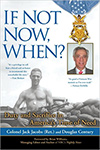Leadership Traits of Ulysses S. Grant
By Thayer Leadership, Thursday, July 22, 2021
Ulysses S. Grant is one of the greatest American leaders to emerge from West Point. General of the Union Army, two-term President, and best-selling author. How did this common, ordinary man achieve such extraordinary things? This excerpt from Lieutenant Colonel (Ret.) John Vigna and Dan Rice’s book West Point Leadership: Profiles of Courage demonstrates Grant’s place in history:
"During Grant’s lifetime, the nation descended into civil war, underwent an imperfect reunion, and emerged a stronger democratic republic. Both as General and as President, Grant’s leadership made the difference in guiding the United States through war, reconstruction, and recovery. When he died in 1885, Grant was easily the most popular figure in America. He had defeated General Robert E. Lee and the Confederacy in battle, and outlived President Abraham Lincoln in peace. Still, 125 years after his death, Grant’s rise to power and renown in the United States remains enigmatic. Many have sought to understand Grant’s complex legacy, one highlighted by his clarity of vision in battle, his political ascendancy after the war, and his shortcomings in private business. Even [General] William Tecumseh Sherman famously remarked, "Grant is a mystery, even to himself.” Regardless, Grant’s achievements distinguish him among his generation of Academy graduates.”
Perhaps Grant’s extraordinary leadership can be encapsulated by these facets:
Single-mindedness- Grant cultivated an ability to complete the task at hand, undeterred by distractions. He focused only on what he could control with dogged determination. There was no turning back. Only moving forward, with a willingness to take risks.
Coolness and Vision- Grant could see the entire battlefield - even the parts that he could not see. He took decisive action with astonishing coolness under pressure. He articulated his meaning, both in writing and in his speech, in plain language. There could be no misunderstanding of his stance.
Humility and Integrity- Grant conducted his entire life with uncommon integrity and disarming humility. He was good and generous to his enemies and magnanimous in victory. When successful, he gave all the credit to others. When he made a mistake, he took full responsibility.
These traits made him, simply, as Elizabeth D. Samet, Professor of English at the United States Military Academy at West Point and editor of The Annotated Memoires of Ulysses S. Grant, said “the consummate American”. "He was the leader of an army that preserved a nation and emancipated four million people.”






